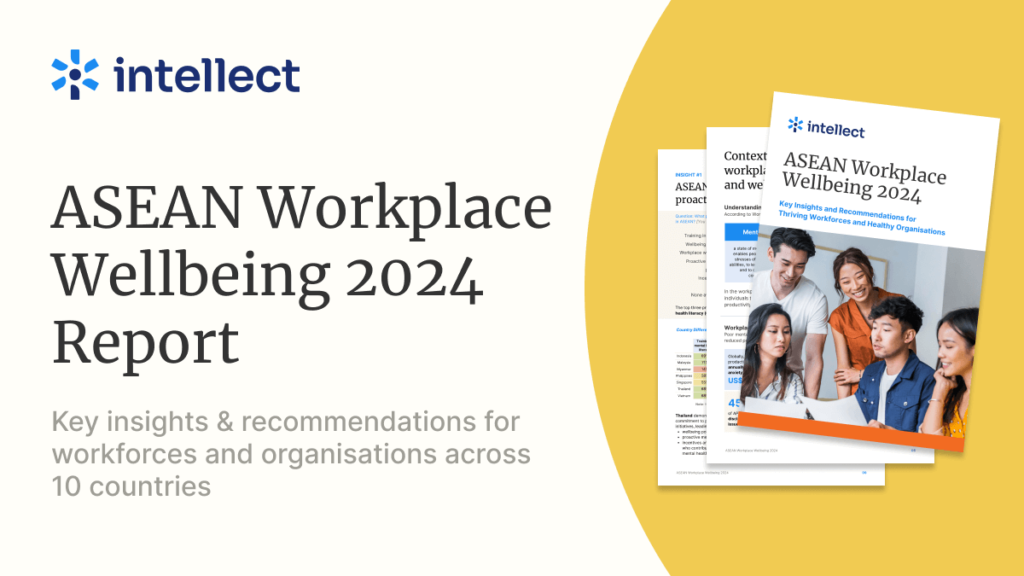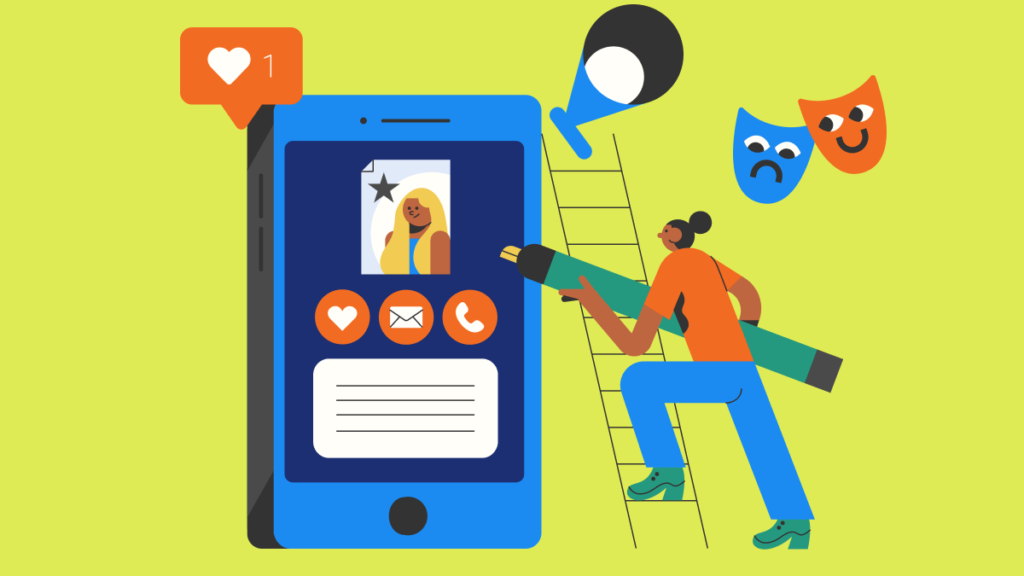Bad days happen to everyone. Often, we might wonder where we can go to seek relief besides speaking with a friend or loved one.
That’s where Intellect’s programmes come in. In our app, we have a growing library of resources that empowers users through guided practices to seek support within themselves.
If you’re wondering where these programmes come from, or how you can delve deeper into certain topics, you’re in luck! This article is your one-stop-shop for mental health resources for every Learning Path on Intellect.
Before we get into the resources, what are Learning Paths?
Learning Paths are 4 to 6 session programmes that revolve around cognitive behavioural therapy (CBT). CBT is a type of psychological treatment that focuses on changing unhelpful thinking and behavioural patterns. It has been shown to be highly effective in improving psychological symptoms in a myriad of problems, such as depression, anxiety, and relationship issues.
In Intellect, we simulate the experience of working with a therapist by creating interactive and engaging bite-sized sessions and check-ins.
Furthermore, you can gain deeper insights into yourself through the validated, science-backed quizzes we use.
The best part is that it only takes 5 to 10 minutes each day for you to improve your own well-being.
Now, let’s take a deeper dive into the topic of your choice.
Acceptance
We all struggle to accept many things in our lives, be it the things that others do or say, difficult situations that we find ourselves in, or even parts of ourselves.
Learning to be more open-minded can help shift our focus from negative thoughts and emotions that cloud our minds from being in the present.
This may grant us the ability to embrace who we are as a whole person, rather than focusing on situations or the aspects of ourselves that we do not like.
Here are some resources on this topic:
Anxiety & worry
Everyone has probably felt worried or anxious about something in their lives.
However, worries can sometimes get out of hand, and we may have a difficult time coping with them.
Problem-solving and challenging them are key skills to cope with anxiety and worry. This Learning Path teaches you to identify triggers and any unhealthy coping mechanisms that might worsen them.
Here are some resources on this topic:
- Anxiety Self-Help Resources – Information Sheets, Worksheets & Workbooks
- The General Anxiety Disorder 7-Item Scale
Assertiveness
If you ever find yourself feeling small or taken for granted by others, this Learning Path is for you.
This path helps you to understand your own communication style, and develop ways to express yourself and assert your thoughts.
Here are some resources on this topic:
Anger management
When we’re angry, we might feel overwhelmed and out of control.
Managing this anger is not only important for our stress levels, but is also crucial in maintaining our relationships with others.
Digging deeper into the root cause of your anger and regulating your emotional response towards situations may help you to decrease stress levels.
Here are some resources on this topic:
- Tolerating Distress Self-Help Resources – Information Sheets & Workbooks
- Emotion Regulation Questionnaire
Criticism
It’s only human to find criticism hard to stomach, but criticism can be a powerful force for change in our lives.
Learning the differences between constructive and destructive criticism allows us to accept positive feedback and grow.
Here are some resources on this topic:
- How to Deal Assertively with Criticism
- Brief Resilience Scale
- Defeating Your Mind Bully: Eliminating Negative Self-Talk
Conflict management
While we often feel frustrated or angry during conflicts, they are simply part and parcel of life.
Conflicts present an opportunity for us to learn and grow in our interpersonal relationships. This Learning Path helps you to understand your conflict management style and learn various skills to cope with conflicts.
Here are some resources on this topic:
- Mastering Conflict Management Skills
- Create a Workplace Conflict Resolution Policy
- Conflict Management Styles Assessment
Coping mechanisms
When we face difficult times, we may fall back on coping mechanisms to help us tide through them.
However, some coping mechanisms are unhealthier than others, and this Learning Path guides you in developing and practising healthier coping mechanisms in the face of adversity.
Here are some resources on this topic:
- Coping Strategies and Defense Mechanisms
- Healthy Coping Skills for Uncomfortable Emotions
- Coping Self-Efficacy Scale
Coping with guilt
Guilt is yet another common emotion that we feel, perhaps over a perceived lack of productivity or an inability to make good on promises.
Although guilt may be a strong motivator, we often end up feeling trapped instead.
Techniques such as mindfulness and self-compassion among others may help you cope with thoughts and feelings of guilt.
Here are some resources on this topic:
- The Scientific Underpinnings and Impacts of Shame
- Dealing with Feelings of Guilt
- Reconsidering the Differences Between Shame and Guilt
- How to Stop Feeling Guilty Over Your To-Do List
- Coping With Guilt And Shame In The Context Of Impulse Buying
Cooperation
Being cooperative is a key skill when it comes to strengthening our relationships with others, and facilitating activities and tasks.
Cooperation may allow us to overcome our egos and build positive relationships.
Here are some resources on this topic:
Decision making
Paralyzed by lunch options, or whether to stay in your job or leave? It’s completely normal to have a hard time making decisions when faced with many choices.
Underlying this indecision is typically the feeling of fear that we’re not taking the best course of action.
This Learning Path teaches you to confront your fears, but also some practical techniques to make decisions.
Here are some resources on this topic:
Digital dependence
We’ve all been distracted by social media or online entertainment, going on social media binges.
While this is completely normal in a digital world, it can become so all-consuming that we neglect our work and even loved ones.
Ultimately, being dependent on our devices is a habit, so we can undo this by identifying and understanding how to cope with situations that tempt us to use our devices.
Here are some resources on this topic:
Digital habits & thoughts
When we’ve had a rough day, it’s easy to turn to our devices to mindlessly scroll through social media or watch TV shows.
However, this may become problematic if we get into the habit of constantly using our devices to cope with difficult thoughts and feelings.
Reduce your reliance on digital devices with techniques to overcome negative emotions and rewrite negative thoughts.
Here are some resources on this topic:
- Treatment for Cognitive-Behavioural Therapy for Internet Addiction (CBT-IA)
- Internet Addiction Test
- 5 bad habits that may be disrupting your mental wellbeing at work
Emotional regulation
Emotions serve as guides to our inner world and needs, but sometimes they get overwhelming.
Regulating them is key to maintaining a level head to cope in various situations.
Learning to regulate your emotions involves understanding the triggers to these emotions, and learning techniques to regulate them.
Here are some resources on this topic:
Focus
We might find our minds wandering or distracted, and when that happens, it can be difficult to refocus our attention.
When we’re not focused on the present moment, it can negatively impact our productivity.
Planning deliberately rejuvenating breaks can help you recenter your wandering mind, and improve your productivity.
Here are some resources on this topic:
- How to Focus a Wandering Mind | Greater Good
- Understanding the Types and Frequency of Breaks Needed to Enhance Our Wellbeing
Healing after a breakup
The end of a relationship is always a heart-wrenching and devastating process. Even if you know that you’ve made the right decision to do so, the road to healing is far from linear nor straightforward – it can be an emotional rollercoaster.
Sometimes you may feel that you’ve lost your sense of self after a breakup. Feeling whole again is a healing process that involves focusing on your needs and rebuilding your personal identity.
Here are some resources on this topic:
- Breakups Aren’t All Bad: Coping Strategies To Promote Positive Outcomes
- How To Reap The Benefits Of Writing After A Relationship Ends.
Responding in conflicts
Conflicts can often become intense and heated when we’re insensitive to the needs of others.
Although we might’ve been hurt during such arguments, there are ways that we can reach a peaceful and respectful resolution.
Learning to respond calmly in times of conflict through step-by-step techniques on validating others and communicating our needs is key to reaching a win-win solution.
Here are some resources on this topic:
- Use Dialectical Behaviour Therapy (DBT) GIVE Skills to Get and Keep Important Relationships
- Social Skills Training
Self-respect
When we constantly give in to others or allow ourselves to be taken for granted, we might realise that we’ve lost our sense of self and feel frustrated as a result.
Learning practical ways to set firm boundaries and communicating your needs enables us to maintain self-respect without coming across as aggressive.
Here are some resources on this topic:
Journaling 101
Keeping heavy thoughts and emotions to yourself can be stressful for your mind and body.
Learning various forms of journaling is a good first step to processing these thoughts and reaping the benefits that come along with making a habit out of it.
Here are some resources on this topic:
- Journaling for Mental Health – University of Rochester Medical Centre
- Journaling: The Most Effective and Cheapest Form of Self Care – The New York Times
- How Journaling Can Help You in Hard Times
Mental health aid 101
When our peers and loved ones are struggling with their mental health, we may not know how to support them.
Mental Health Aid is a course that will expand your understanding of mental health issues and impart tools that will empower you to know what to do and say to a person who might be facing mental health issues.
Here are some resources on this topic:
- Mental Health in the Workplace
- How To Support Mental Health At Work
- Questionnaires On Stigmatising Attitudes
- 60 self-care tips to improve your mental health
Perfectionism
We might think of perfectionism as something that will push us to excel, but this can be detrimental to our well-being by worsening our stress.
Instead of pinning such unsustainable expectations on ourselves, we can start with identifying and understanding the thoughts behind your perfectionism.
Learning to accept mistakes and take failure positively allows us to excel while being kind to ourselves.
Here are some resources on this topic:
Procrastination
One misconception about procrastination is that it stems from laziness, when in fact, we procrastinate to avoid doing a task that makes us uncomfortable.
To stop procrastination in its tracks, we may start with being able to accept discomfort in our daily lives, and develop practical strategies to manage our time and motivate ourselves.
Here are some resources on this topic:
Self-esteem
We’ve all had moments where the thought of not being good enough crosses our minds, making us feel inadequate.
While it is common to think and feel this way from time to time, it can be harmful to us if we constantly view ourselves in this manner.
We need to break free of these unhelpful thoughts to boost our self-esteem by learning how to maintain more balanced expectations of ourselves and practise self-compassion.
Here are some resources on this topic:
Managing your stress
Stress is a normal part of life. In actuality, a manageable level of stress can keep us active and alert. However, stress can become harmful when our thoughts and emotions spiral out of control. Turn harmful stress into a source of motivation by identifying and challenging stress-inducing thoughts to cope with difficult feelings.
Here are some resources on this topic:
- Tame Reactive Emotions by Naming Them – Mindful
- Unhelpful Thinking Styles – CBT Resources for Clinicians
Rewriting your money narratives
Watching our parents spend and save money from a tender age has an indelible impact on our beliefs around money as adults.
These beliefs are called money narratives, and some of them can actually worsen our financial stress and mental health.
Understanding what your money narratives are and learning to challenge them may improve your relationship with money.
Here are some resources on this topic:
- How Clients’ Money Scripts Predict Their Financial Behaviours
- Financial Therapy: Theory, Research, and Practice
Journey to a better you
You’ve made it to the end of this list!
When you’re feeling down and out, or just need a boost in changing habits, you can relook at this list to dig deeper into your habits and change them for the better.
We at Intellect sincerely hope that this list will kickstart your journey to a better you!





